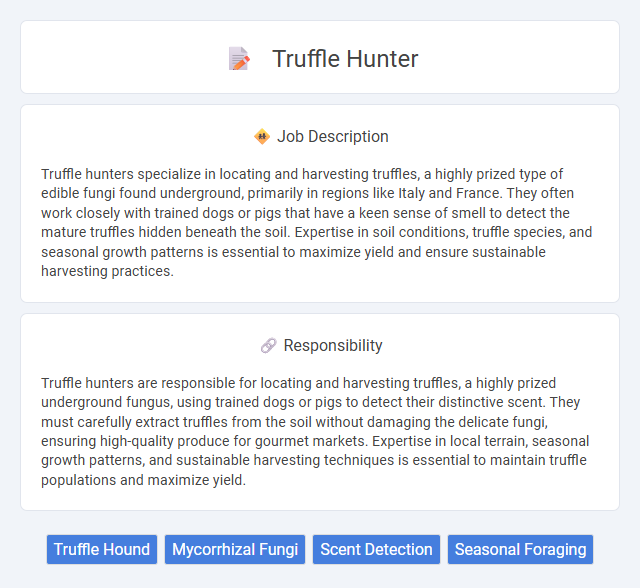
Truffle hunters specialize in locating and harvesting truffles, a highly prized type of edible fungi found underground, primarily in regions like Italy and France. They often work closely with trained dogs or pigs that have a keen sense of smell to detect the mature truffles hidden beneath the soil. Expertise in soil conditions, truffle species, and seasonal growth patterns is essential to maximize yield and ensure sustainable harvesting practices.
Individuals who enjoy spending extended periods outdoors and have a strong affinity for nature are more likely to thrive as truffle hunters. Those with patience, keen observation skills, and a willingness to work in varying weather conditions may find this job suitable. However, people who prefer structured environments or sedentary work might face challenges adapting to the physically demanding and unpredictable nature of truffle hunting.
Qualification
Truffle hunters require extensive knowledge of truffle species, natural habitats, and seasonal growth patterns. Proficiency in training and handling truffle-sniffing animals, typically dogs or pigs, is essential for effective truffle detection. Strong observational skills, patience, and physical endurance are also critical qualifications for success in this specialized foraging profession.
Responsibility
Truffle hunters are responsible for locating and harvesting truffles, a highly prized underground fungus, using trained dogs or pigs to detect their distinctive scent. They must carefully extract truffles from the soil without damaging the delicate fungi, ensuring high-quality produce for gourmet markets. Expertise in local terrain, seasonal growth patterns, and sustainable harvesting techniques is essential to maintain truffle populations and maximize yield.
Benefit
Truffle hunter jobs likely offer the benefit of working outdoors in natural environments, which can enhance mental well-being and physical health. There is a strong probability of earning income through the sale of valuable truffles, a highly sought-after delicacy in the culinary market. Opportunities for developing skills in animal training and foraging techniques might also be part of the job's advantages.
Challenge
The truffle hunter job likely involves navigating dense forests and unpredictable terrain, requiring keen senses and patience to successfully locate rare truffles. Physical endurance and extensive knowledge of local ecosystems probably increase the chances of finding valuable truffles. The challenge of this role might also stem from seasonal limitations and competition from other hunters, making it a demanding yet potentially rewarding pursuit.
Career Advancement
Truffle hunters develop specialized skills in identifying and harvesting rare truffles, enhancing their expertise through hands-on experience and knowledge of local ecosystems. Career advancement opportunities include becoming expert truffle foragers, managing truffle farms, or collaborating with gourmet restaurants and luxury food suppliers. Mastery in truffle cultivation and market dynamics can lead to roles in agricultural consultancy or truffle product entrepreneurship.
Key Terms
Truffle Hound
Truffle hunters rely heavily on trained Truffle Hounds to locate underground truffles, a highly prized and expensive culinary delicacy. These dogs possess an exceptional sense of smell, enabling them to detect the unique aroma of truffles buried beneath forest floors, significantly increasing the efficiency of truffle harvesting. The partnership between truffle hunters and Truffle Hounds is vital for sustainable truffle foraging, ensuring the preservation of truffle ecosystems and maximizing yield.
Mycorrhizal Fungi
Truffle hunters specialize in locating truffles, which are the fruiting bodies of ectomycorrhizal fungi symbiotically associated with tree roots. These mycorrhizal fungi play a vital role in forest ecosystems by facilitating nutrient exchange between the soil and host trees, enhancing tree growth and soil health. Mastery in identifying truffle-rich environments and understanding mycorrhizal networks is essential for successful truffle harvesting.
Scent Detection
Truffle hunters specialize in scent detection using trained dogs to locate subterranean truffles with high precision. These animals are trained to identify the unique aroma compounds emitted by mature truffles, enabling efficient and sustainable harvesting. Advanced scent detection techniques increase yield and reduce environmental impact by minimizing soil disturbance.
Seasonal Foraging
Truffle hunters specialize in seasonal foraging, targeting the brief autumn and early winter months when truffles reach peak maturity underground. Using trained dogs or pigs to detect the complex aroma of truffles, they carefully excavate these rare fungi to ensure sustainability and quality. This role demands in-depth knowledge of forest ecosystems, weather patterns, and fungal biology to maximize successful harvests during the limited foraging period.
 kuljobs.com
kuljobs.com